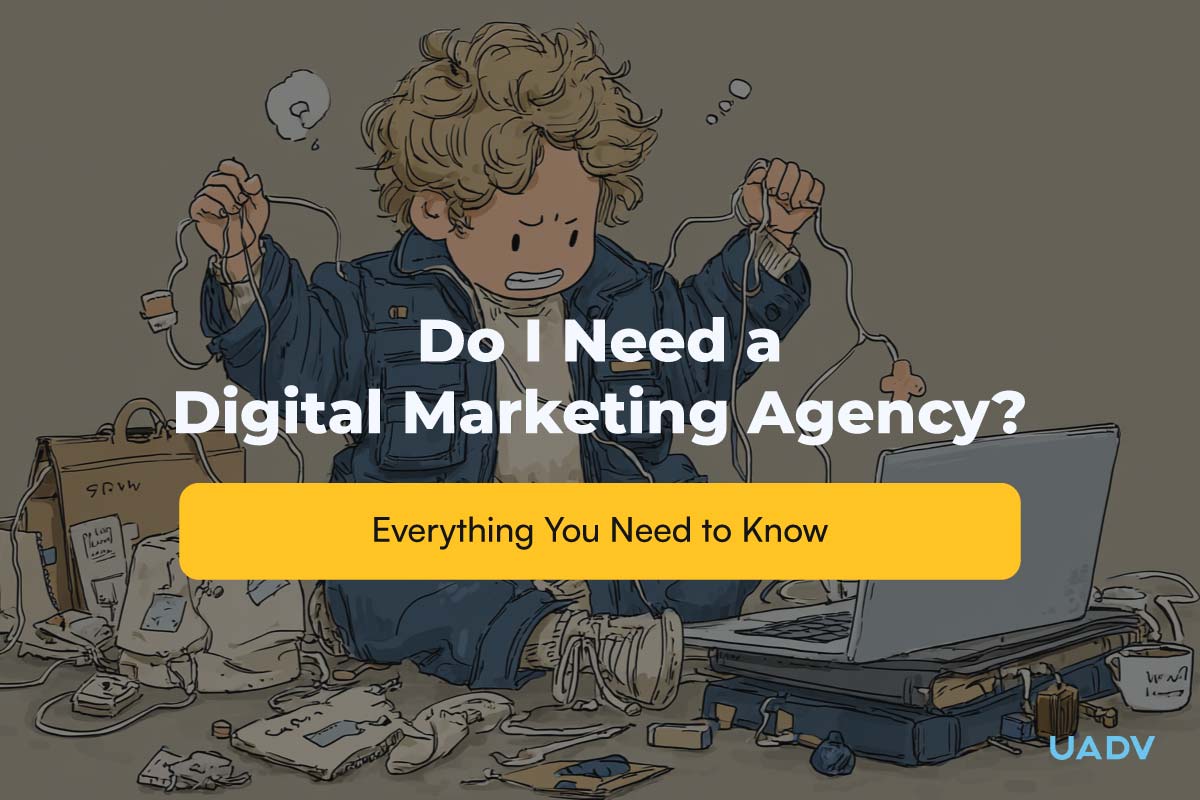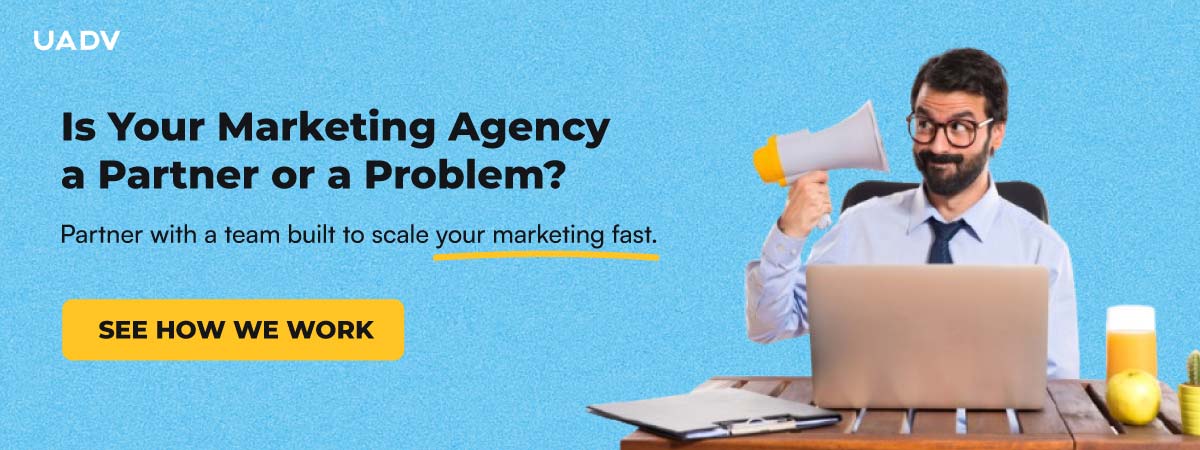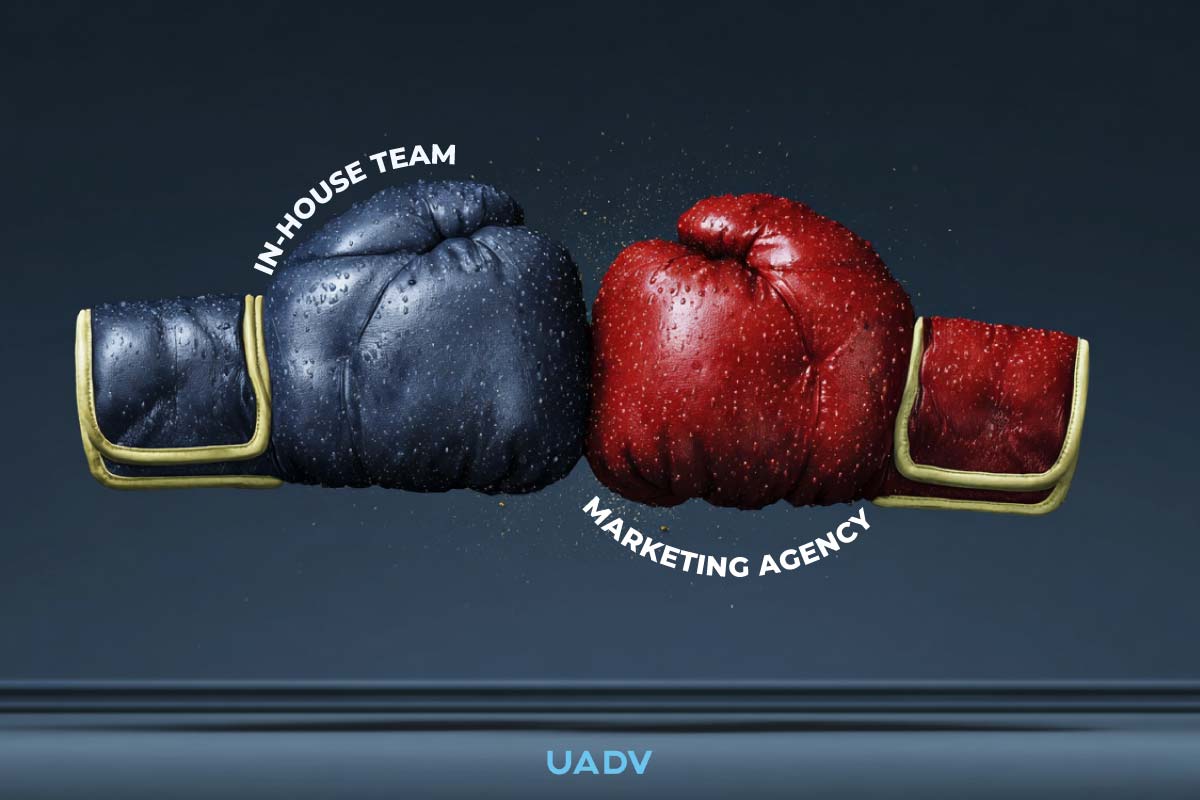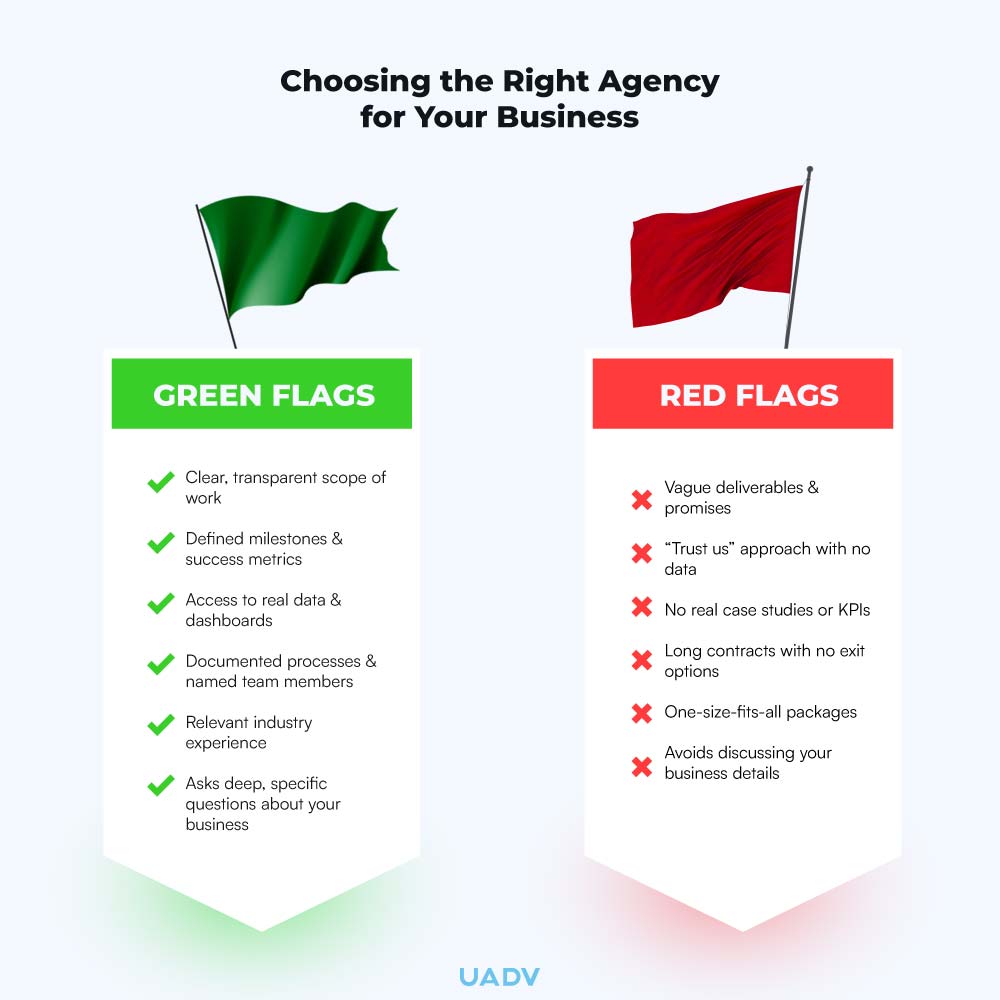

“Do I need a digital marketing agency?” If you’ve typed that exact phrase into Google or asked your phone the same question, you’re in good company.
Owners, founders, and marketing managers reach this crossroads all the time. When you get the decision right, you unlock growth, visibility, and precious time. When you get it wrong, you burn budget, stall momentum, and lose focus.
This guide is here to give you clarity. You’ll see who actually needs an agency, who doesn’t, what agencies really do, and how to choose the right partner when you’re ready. By the end, you’ll have a simple framework to decide whether to hire, build in-house, or double down on what you’ve already started.
There’s a moment in most growth journeys when marketing starts to get messy. The early wins level off, a dozen new platforms appear overnight, and strategy calls that used to take an hour now take three.
“Wondering when to hire a digital marketing agency? Here’s why many businesses do.” Often, the first nudge is a plateau. You’re posting on social, sending emails, writing blogs, maybe even running a few ads, but website traffic and qualified leads have flattened.
Another nudge is complexity. What began as a few straightforward tasks swells into SEO, content, PPC, paid social, email automation, conversion rate optimization, analytics, and creative production, each with a learning curve and a set of tools.
Bandwidth is the next pressure point.
Your in-house staff is spread thin across competing priorities, and even great ideas get stuck in backlog limbo. The stakes climb, too.
Launches, new markets, bigger ad budgets, or tighter targets turn small missteps into expensive mistakes. At that stage, outside expertise becomes less of a luxury and more of an operating necessity.
Agencies help you refine your strategy, clean up tracking, and execute consistently so you stop guessing and start compounding results. That said, not everyone needs an agency immediately. Some teams can run lean, test the basics, and build muscle first. The rest of this article will help you figure out which camp you’re in.
So, what problems do in-house marketing teams usually face? The short answer is specialization, speed, and staying current.
Most small teams have one or two strong generalists. They are resourceful, creative, and indispensable, but it’s unrealistic to expect deep expertise in technical SEO, advanced PPC structures, landing page development, creative direction, analytics implementation, and email lifecycle strategy from the same person.
When one person wears many hats, implementation slows, experimentation drops, and quality can suffer.
Tools are another friction point. Platforms like Google Ads can devour budget when they’re misconfigured. Broad match keywords without proper negatives, clunky conversion tracking, and thin or mismatched landing pages lead to spend without learnings.
If you’re exploring paid search, it’s worth calibrating expectations with a primer on Google Ads cost so you don’t scale prematurely.
And while bargains are tempting, cheap SEO almost always comes with hidden trade-offs. Finally, the pace of change is relentless. Search algorithms update, ad platforms tweak targeting, and new features roll out constantly. Keeping up is a full-time job, which is rarely the job your in-house team was hired to do.
“How do you know it’s time to stop doing marketing on your own?”
Look for stalled organic growth even though you’re publishing regularly, inconsistent branding that makes your website, ads, and social feeds feel like they belong to different companies, and reporting you don’t fully trust.
If your week is a loop of Canva tweaks, basic email blasts, and boosted posts that never move the needle, you’ve likely hit the ceiling of DIY tactics, especially in competitive categories. See this brief overview of industries most in need of digital marketing to gauge pressures in your space.
The clearest sign is opportunity cost. Every hour you spend tweaking campaigns is an hour not spent improving your product, mentoring your team, building partnerships, or refining operations.
Growth stage companies often outgrow the idea that more time will fix everything. At that point, you need deliberate strategy, better creative, and expert execution to break through the plateau.
The benefits of hiring a digital marketing agency show up in speed to value, breadth of expertise, and long-term consistency.
Specialists can spin up campaigns quickly, avoid common pitfalls, and focus on meaningful tests instead of busywork. You also gain access to better tools, better data, and better processes.
Agencies live inside SEO suites, ad platforms, analytics dashboards, and testing environments every day, and that experience compounds across clients and categories. Over time, the compounding returns are what matter most.
Editorial calendars, technical fixes, content hubs, link acquisition, paid social creative testing, and proper conversion tracking create a virtuous cycle.
The work you do this quarter improves the returns you see next quarter.
Meanwhile, you get peace of mind and time back to focus on the parts of the business only you can lead. If you want more on the organic side, this explainer on the importance of SEO is worth bookmarking.
The honest answer depends on your stage, your goals, and your constraints. Think of this as a capital allocation decision.
Where does your next dollar and your next hour create the most return? For some, the best move is to build in-house.
For others, the smarter path is to outsource. For many, the right answer is hybrid. Keep a strategic core internally and supplement with agency specialists.
If you’re weighing budget and timing, it helps to take a step back and frame your marketing investment like any other investment with expected returns, a time horizon, and known risks.
Do you realistically have the time and attention to manage marketing effectively, or will other priorities always win?
Are you confident in your current strategy and execution, or are you guessing and hoping the numbers improve?
Can you measure ROI today with reasonable accuracy, or are you flying blind?
Add a few more test questions like “Are your goals clear and achievable based on your sales cycle and margins?” “Do you have a functioning sales process to catch and convert the demand that marketing creates?”
Working through those questions often saves months of churn and helps you avoid hiring too early or too late.
The best time is when you have a validated offer, clear goals, and the need to scale faster than your current team can manage.
Agencies shine during major launches, expansions into new markets, and revenue plateaus that require fresh thinking and rigorous testing.
They also make sense when your internal team has a clear gap, such as technical SEO, conversion rate optimization, or high velocity creative production, and you want to move now rather than wait through a long hiring cycle.
There are moments when hiring an agency is premature.
If your goals are fuzzy, your product market fit is unproven, or you don’t have a sales process to catch and convert leads, it’s often smarter to tighten the fundamentals first. If your budget is too small to run meaningful tests, you risk spreading a little money across too many channels and concluding that nothing works.
If stakeholders are not ready to collaborate, approve assets, or act on data, you will not get the benefit you are paying for.
Readiness shows up in practical ways. Your workflows are organized enough to provide timely approvals, assets, and feedback.
Your brand positioning is articulated, even if it needs polish, and you know who you serve and why you’re different. Your KPIs are defined and realistic for your stage, such as revenue targets, pipeline milestones, cost per acquisition ranges, or return on ad spend thresholds.
Your analytics are installed correctly, your conversions are tracked, and your reports are trustworthy enough to make decisions.
Most importantly, you’re willing to collaborate, test, and iterate.
One helpful step before engaging is to prepare a short onboarding checklist with logins, brand guidelines, priority pages, prior reports, and any historical campaigns. If you’d like an outside perspective before committing, a digital marketing consultant can run an audit and lay out a right-sized plan.

Services vary by firm, but the core is strategy plus a blend of execution across search, ads, content, social, web, email, analytics, and creative. Knowing what you truly need helps you evaluate fit and avoid paying for services you won’t use.
SEO, or search engine optimization, improves your ability to rank and be found by the right people.
It blends technical cleanup, helpful content, and authority building. The returns compound over time, which is why SEO underpins almost every durable acquisition engine. PPC, or pay-per-click advertising, buys visibility now.
Platforms like Google Search and Meta Ads let you test messages, audiences, and offers at speed, and when run well, create a predictable pipeline you can dial up or down. Local SEO is the lifeblood of many small businesses.
Your Google Business Profile, local citations, and location pages influence how often you show up in Google Maps and how many calls and store visits you get.
If you want to rank on Google or run ads that bring in actual leads instead of vanity clicks, start with clean tracking and conversion-focused landing pages, then layer on paid campaigns to accelerate early learnings.
Agencies handle the work that most teams struggle to sustain month after month. Planning, scheduling, posting, engaging, and reporting.
They also take on creative production such as reels and shorts, carousels and statics, blog articles and guides, email sequences and nurture streams.
It’s helpful to separate organic content from paid social. Organic builds community, credibility, and brand recall. Paid extends reach to specific audiences and drives conversion events.
“What’s included in content marketing services? Can an agency run my social media?”
Usually, that means a strategy rooted in your goals, content calendars with clear themes and formats, creative assets, copy, publishing, community management, and a monthly review of what worked and what did not.
The real advantage is consistency in quality, which is difficult to maintain when your internal team is already at capacity.
This is where perception meets performance. Branding clarifies your positioning and voice, gives your team guardrails, and builds trust with prospects who have not met you yet. Web design and development translate that brand into a fast, mobile-first, conversion-focused experience.
Page speed, UX, accessibility, and content architecture matter to both humans and algorithms. Strategy ties everything together, aligning go-to-market, web, and PR and marketing so efforts complement rather than duplicate.
Funnels, lead magnets, lifecycle email, competitive research, and budget allocation across channels. If you’ve wondered whether you need help with your website, the answer is yes when bounce rates are high, pages are slow or hard to navigate, or prospects tell you they can’t find what they need.
Strong design and aligned messaging improve paid and organic performance at the same time.

“Should I hire a marketing agency or build a team? Is it better to outsource marketing?” The honest answer is that it depends on your goals, your time horizon, and your appetite for managing specialists.
In-house gives you more day-to-day control and faster access to internal knowledge, but it also requires time to recruit, onboard, and continuously train.
Agencies deliver breadth immediately, but they work best when you set clear goals and collaborate.
In-house costs are more than salaries. You’ll cover benefits, tools, training, and management overhead.
You may still outsource specialty projects like video, advanced analytics, or high-volume creative. Agency pricing varies by channel mix and deliverables, typically using retainers, project fees, or hybrid models.
Agencies can feel more expensive upfront, yet they often reduce trial and error and compress time to value across multiple channels.
If you’re calibrating numbers, this overview of marketing agency pricing is a helpful benchmark. Do not forget the hidden costs many teams miss.
The tool stack you’ll need to do the job well, the time it takes to hire and ramp new roles, and the opportunity cost of leadership attention pulled away from core operations.
Agencies come with specialists such as ad managers, SEO strategists, copywriters, designers, and developers who already work well together.
That means stronger execution on day one. A small in-house team can be excellent, but even great generalists reach limits when asked to cover every channel. Agencies also scale up and down quickly.
Need to double ad spend for a seasonal push, run an international rollout, or pause and regroup. You can pivot without restructuring your org chart. “Does an agency have more marketing expertise?”
Not categorically, but the breadth of pattern recognition across industries and platforms increases the odds that they have solved a version of your problem before.
Many leaders worry they will lose control by outsourcing. A good agency earns your trust with reporting, transparency, and collaboration.
You will know what is being done, why it is being done, and how success will be measured. Agencies often pivot faster because their processes and tooling are built for change, while internal teams can be constrained by competing priorities.
The shared language of KPIs such as qualified leads, CAC, ROAS, pipeline, and revenue keeps everyone aligned. Set a reporting cadence, agree on decision windows, and specify the thresholds that trigger changes in strategy or creatives.

It is easy to feel overwhelmed by pitch decks that promise the same outcomes. Start by separating style from substance. The right partner will make your business smarter, not just your ads prettier.
Red flags are patterns, not one-off quirks. Vague deliverables, mushy promises, and a trust us approach are early warnings. If an agency cannot show you real case studies with real numbers and clear KPIs, keep looking. Long contracts with no exit ramps rarely align incentives.
One-size-fits-all packages tend to oversell and underdeliver on complex problems.
Green flags are equally clear. Expect a transparent scope, a project plan with milestones, and agreed-upon success metrics.
Ask for data access and examples of the dashboards you will see. Look for documented processes and named team members, not generic titles. Relevant industry experience helps, but the real signal is whether they ask sharp questions about your customer, your margins, your capacity, and your sales cycle before proposing tactics.
For an external perspective, this Forbes guide to choosing an agency offers a useful checklist.
Treat the conversation like interviewing a key hire. Ask who will manage your account day-to-day and what each person’s responsibilities are.
Ask what success looks like by 30, 60, and 90 days, and how they will measure it. Clarify the communication cadence and the channel you will use, whether email, Slack, or weekly calls, so nothing drifts.
Learn more about what they will need from your side to move fast, including approvals, subject matter input, and assets. Ask how they test and learn, how they decide what to test next, and what happens if the initial plan misses targets. The answers you get need to be specific.
A good agency adapts to your goals rather than forcing you into a template.
They should map tactics to outcomes such as revenue targets, pipeline growth, CAC thresholds, or brand metrics, and they should be candid about trade-offs.
If your goal is sales velocity, heavy content may not be the first move. If your goal is quality pipeline, broad reach campaigns might be the wrong early test. Ask how performance will be tracked, which dashboard will serve as the source of truth, and how attribution will be handled when it is imperfect, which it always is.
Find out about scalability as well. When early signals are strong, how do we add budget or channels without diluting performance?
When signals are weak, how quickly do we pivot? If you are still deciding whether to go all in or start lighter, a digital marketing consultant can run a sprint to validate assumptions before you commit.
“Is it worth it to hire a digital marketing agency?” It is worth it when you have clear goals, a functioning sales process, and the need to scale faster than your current resources allow.
It is not magic, and it is not an excuse to outsource your strategy. It is a way to grow smarter with the right support.
If you spend more time figuring out what to do than executing, or your campaigns plateau despite consistent effort, bringing in specialists is a sensible next step.
Be choosy. Align on KPIs, timelines, and communication. Stay close to the data and the customer. Strong fundamentals beat shiny tactics every time.
Why continue wasting more time and money on marketing strategies that don't work? Your business deserves better marketing. Say goodbye to empty promises and half-ass results; UADV is the only full-service marketing agency that grows your business, no excuses. Get a free consultation with our expert team now by visiting our digital marketing consultant page.
The benefits of hiring a digital marketing agency are vast. A digital marketing agency is worth it when you need specialized skills, faster execution, and measurable ROI. Agencies reduce trial and error, build compounding SEO gains, and run efficient ad spend with reliable tracking.
What you should pay depends on scope, channels, and goals. Expect retainers or project fees that scale with deliverables and complexity. Benchmark models and ranges before deciding, and tie cost to outcomes, not activity.
Small businesses need digital marketing to be discovered, trusted, and chosen. Local SEO, reviews, and targeted ads drive calls and foot traffic even on modest budgets, and they establish credibility where customers actually search.
Any business that wins or loses customers online relies on digital marketing. Local services, e-commerce, B2B, healthcare, and professional services all benefit from visibility, trust signals, and conversion-focused experiences.
They’re worth it when the expected revenue lift exceeds fees and you need specialized skills fast (SEO, paid ads, creative). Agencies bring process, tooling, and momentum. If budgets are tight or goals unclear, delay engagement and validate channels with lightweight tests first.
An agency plans and executes growth across SEO, PPC, social, content, email, web, and analytics. You gain specialists, tools, and processes that are disciplined around KPIs so you can scale responsibly and learn quickly.
You likely need one if growth has stalled, you lack specialized skills, or you cannot measure ROI. Clear goals, a working sales process, and a willingness to test and iterate are strong signs you are ready to hire.
Pros include expertise, speed, scalability, and cross-channel strategy. Cons include less day-to-day control, some ramp-up time, and retainer costs. The right agency mitigates these with transparency and a focus on performance.
Many can, especially with a focused scope. Start with essentials like local SEO, key landing pages, and tight ad tests. Avoid spreading small budgets across too many channels. Depth beats breadth when funds are limited.
It depends on your goals and timeline. In-house offers control and institutional knowledge. Agencies deliver breadth and speed. A hybrid model with core internal roles supported by agency specialists often balances both strengths.
Hire when you have clear goals, validated offers, and a need to scale. Product launches, new markets, or revenue plateaus are common triggers. Agencies also help when you must move faster than hiring cycles allow.
Ask who manages your account, how success is defined at 30, 60, and 90 days, how often you will communicate, and what they need from you to move fast. Request sample reports, discuss testing methodology, and clarify exit options.
Digital marketing for small businesses means local SEO, Google Business Profile, reviews, email newsletters, social content, and targeted ads. Start with clear goals and audiences, ship a fast landing page, capture emails, measure with analytics, and iterate monthly for steady growth.
Instead of listing the pros and cons of digital marketing agencies, use this quick test: Do you need multi-channel expertise quickly, consistent output, and senior strategy? Outsource digital marketing. Is brand voice/community core and internal content strong? Hire in-house. Hybrid option: strategist + vetted freelancers.
.webp)
Our team will compare you to your biggest competitors in your industry across multiple points from SEO to social media so you can find strengths & weaknesses in your business.